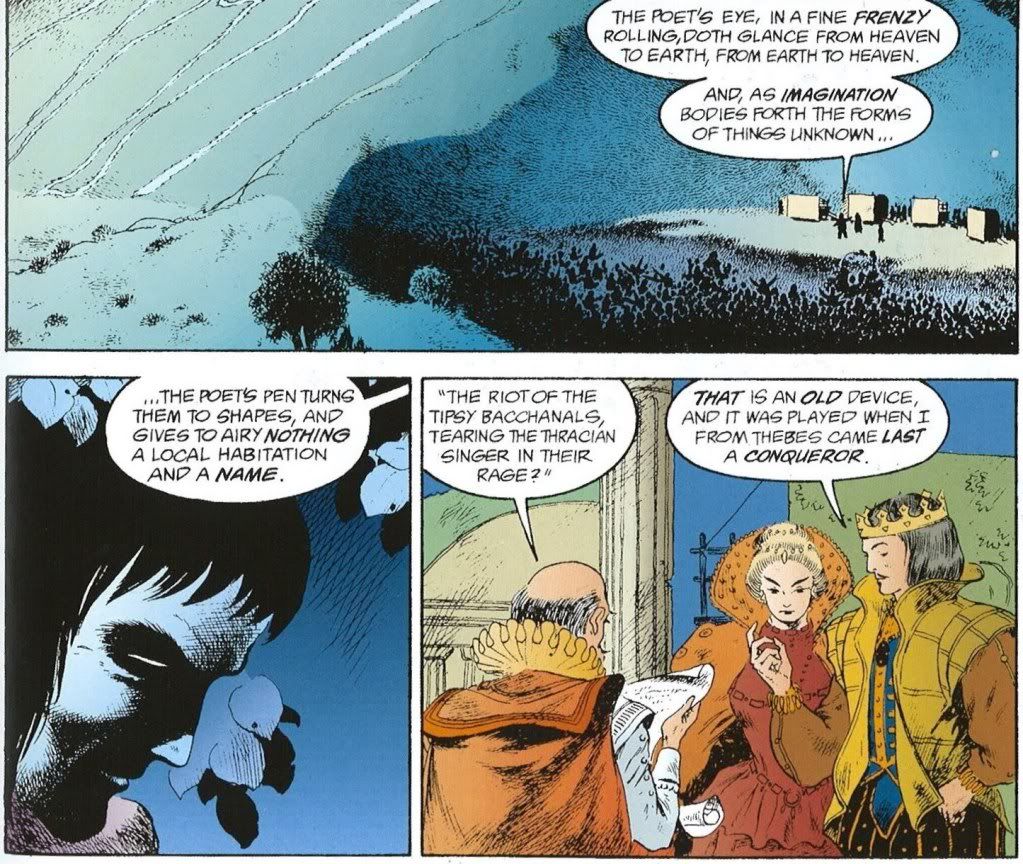
I feel that it's important for me to admit here that I am no great fan of A Midsummer Night's Dream (the play, not this comic. I LOVE this comic). Lord, it's probably more important to admit that I am no great fan of Shakespeare (call me whatever names you want, but I have done my time. Give me Ben Jonson any day. Yes, I am aware the Jonson to Shakespeare comparison is Beethoven to Mozart, but now I am digressing before I have even begun*). But Midsummer Night's Dream irritates me more than any other of the Bard's works (twee, twee, illogical twee, based entirely on plot contrivance. Further detail involves a whole other post).
But my personal dislike is neutralized, as usual, by the beauty of Gaiman's artistry; this is a story about a creator who once made a deal with the devil -- here Shakespeare is Faustus and Dream is Mephistopheles (or, in a neat parallel with the Calliope story, Shakespeare is Madoc, senseless in his quest for creation, relying on a bargain that can only be repaid in the worst possible way for him.) Lest you forget this particular deal, flip back through Doll's House for Hob's seemingly random eavesdropping in the pub.
This issue does have some of the best panels in Sandman history. The shot of the fairy kingdom watching the players set up the theatre suggests an almost infinite audience. But the satyr sitting on the trolls shoulder? It reminded me of this ridiculous painting from one of my favorite episodes of Parks and Recreation (Leslie Knope is Di-Athena, for the painter is a moron):

Back when I first read the story, I really did appreciate the tragedy of Hamnet. But my goodness, he is SO WHINY. When you see him eating the fairy fruit, it's a little bit hard not to cheer. But poor Will Shakespeare. At least he has the good sense to regret his deal with Morpheus before he is dealt the final blow.
AND SPEAKING OF DOMAINS
Is this our first encounter with Faerie in the Sandman series? If I have missed one, forgive me. But there are strong hints of two eternal domains, that of Faerie and that of the Dream's family, forever at odds with each other.
But we learn that Dream can keep Faerie alive long after they're gone, alive in dreams and in stories. That is his true gift: an immortality of sorts. And thus he uses Shakespeare's gift to his own ends, though we don't yet learn what ends those might be. This story is layeredskillfully, featuring stories within stories within long games and the pettiness that so frequently enlivens the lives of immortals in fiction.
This, ultimately, is what separates Shakespeare's action from that of Madoc's: the bargain is never exactly clear, none of the immortal beings involved can fully be trusted, and it's quite likely that Will would never recognize that Hamnet's fate was cosigned by himself. But when Morpheus asks "have I done right" we learn that Morpheus does know. Which makes it slightly heinous, a deception predicated on one side not knowing all the facts (which is precisely what irritates me about Midsummer Night's Dream and so many other Shakespeare plays). Dream knows this wasn't a trick of the fates, he knows in his heart that he "tricked" Shakespeare, even though he likely believes that the bargain is fair and equitable on its face. Dream is beginning to comprehend the sadness of mortals, and this will probably change his very being.
Separately, I have to recommend The Great Night: A Novel , by Chris Adrian, which tells the tale of a very dark version of Midsummer Night's Dream, set in San Francisco's Buena Vista Park during the summer solstice. The New Yorker site has posted a free story from the novel called "A Tiny Feast,", which is beautiful and heartbreaking (I wrote about it here: http://theoncominghope.blogspot.com/2010/10/short-story-book-club-tiny-feast.html)
*I don't like Mozart either.

